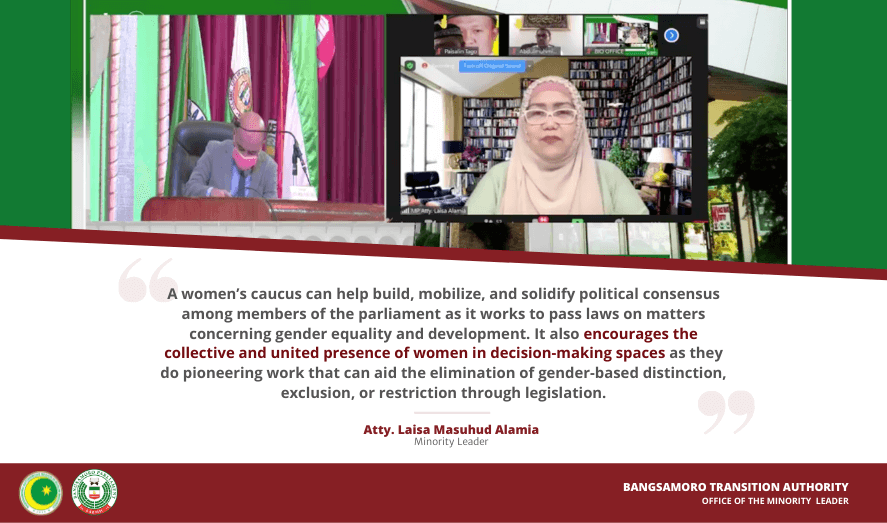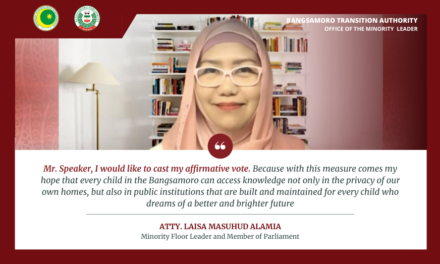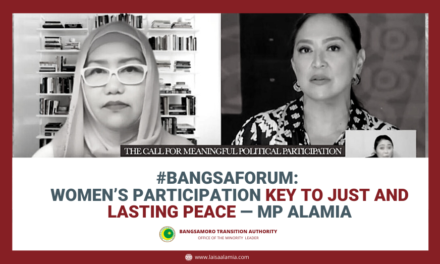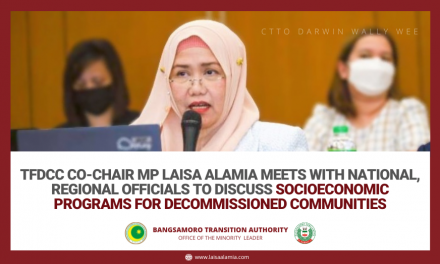Full transcript of Atty.Laisa Masuhud Alamia’s sponsorship speech:
Assalamualaykum wa rahmatullahi wa barakatuh.
In recent years, there has been a lot of discussion regarding equality and meaningful representation in government, especially within the context of our ongoing political transition in the Bangsamoro. As we work towards a truly inclusive regional government, representation must go beyond allocating government seats for marginalized sectors and achieving equality goes beyond opening up spaces where sectoral representatives can express their views.
At the end of the day, ensuring genuine and meaningful representation requires a collective effort to amplify the voices of the marginalized, and to lend our strength in support of policies and programs they may want to pursue as they push for the safety and welfare of their community.
The data shows us that half of the Bangsamoro region’s population is female. However, within the parliament representing the people of the Bangsamoro, only 13 of 80 seats are held by women — just one woman for every five men in the parliament. Outside of the regional government, women have always stood at the frontlines of the struggle for equal rights and representation, and yet opportunities to participate in actual governance and public service remain limited due to an inherently patriarchal system that places a premium on male leadership and female subservience.
As we lead the political transition in the Bangsamoro region, we are in the perfect position to not just acknowledge the need for better representation but to also act and respond to this need directly.
The Women’s Caucus Bill hopes to jumpstart better representation of women’s issues and concerns in the regional government. This proposed legislation is anchored on the provisions of the Philippine Constitution which recognizes the role of women in nation-building and ensures the fundamental equality of women and men before the law, and of the Bangsamoro Organic Law (BOL) which guarantees seats for women both in the parliament and cabinet as it mandates the enactment of a law recognizing the important role of women and their representation in decision-making and policy-determining bodies of the Bangsamoro Government.
The Women’s Caucus, according to the proposed bill, should be constituted within 30 days after the election of the Speaker of the Parliament. It is a platform for women members of the parliament to consolidate representation for the women’s agenda, while developing and sharpening a legislative agenda that tackles key issues that primarily concern women, gender equality, and gender development.
Having a women’s caucus can help build, mobilize, and solidify political consensus among members of the parliament as it works to pass laws on matters concerning gender equality and development. It also encourages the collective and united presence of women in decision-making spaces as they do pioneering work that can aid the elimination of gender-based distinction, exclusion, or restriction through legislation.
The caucus also serves as a venue in which members can advance a broad range of women’s issues in the Bangsamoro. Integral to its function is the formulation of a comprehensive Women’s Legislative Agenda that lists down bills and resolutions corresponding to issues that concern women, gender equality, gender development, and elimination of discrimination, among others. The lead officers of the caucus shall come from different parliamentary factions or parties in order to broaden the representation in the make-up of the Caucus leadership as it aims to be truly representative of the diverse women in the region.
As a women’s caucus, all incumbent female members of parliament will comprise the Caucus unless they submit a request to be excluded. The caucus will include all women, including transgender, non-binary and gender non-conforming women, as part of an effort to break free from conventional assumptions surrounding gender and identity. Being surrounded by fellow women in the initial stages of legislation in the Bansgamoro helps strengthen the confidence of an otherwise limited number of women in government, giving them an opportunity to discuss ideas and influence policy agenda that center women’s voices and experiences which are at risk of being silenced and overlooked.
We have an opportunity here. They say that political transitions are “moments to break patterns of exclusion as they can be openings to transform the broader political, legal, and social barriers to an inclusive kind of politics.” The Bangsamoro political transition is an opportunity to institute mechanisms for meaningful and fair representation in government, which can have crucial implications for democratic legitimacy and resilience in our government institutions. In ensuring meaningful and effective representation in government, especially for the marginalized sectors, We have to start at the Parliament.
In the process of drafting and submitting this bill for the approval of the parliament, it has been strongly endorsed by my fellow women members of the BTA– Maisara Dandamun-Latiph, Bainon Karon, Baintan Ampatuan, Susana Anayatin, Nabila Pangandaman, Aida Silongan, Diamila Ramos, Sittie Mastura, and Princess Maleiha Candao — and this bill has benefitted from the support of progressive male colleagues from both the majority and minority blocs, namely: Atty. Rasol Mitmug, Jr., Atty. Nabil Tan, Atty. Jose Lorena, Atty. Suharto Ambolodto, Amilbahar Mawallil, Engr. Don Mustapha Loong, Rasul Ismael, and Atty. Paisalin Tago. It is my ardent prayer that the rest of the parliament can appreciate the need to open up spaces where women members of parliament can speak in confidence with her women colleagues regarding matters that strongly and specifically affect women, to provide platforms where women legislators can help their fellow women from other sectors in pushing for changes and reform, and to support and empower women by pushing for legislation that highlights and centering a unique perspective viewed through the lens of gender and development. This parliament cannot limit itself to merely claiming to speak and act on behalf of women while its composition and structure is in itself a reflection of the lack of genuine and meaningful representation in government. It must listen to and lift women’s voices while strongly advocating for the principles and perspectives of women within its ranks, as we work towards a building a society that truly thrives on justice and equality.








